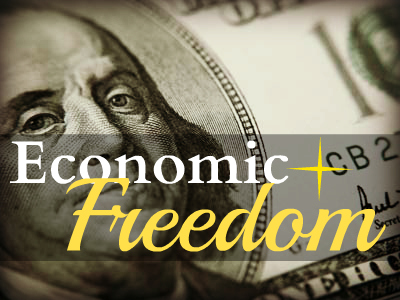Index of Economic Freedom was released last week. Slovakia ranked 57th – 15 places down from previous year. The main reason behind a decline of economic freedom in Slovakia was higher taxation, non-flexible labor market regulation, and slow and inefficient judiciary system. We belong among 59 other countries where economic freedom has decreased this year. On the other hand, the economic freedom globally has been the highest in 20 years; it was the lowest in 1997. The freest economies are Hong-Kong, Singapore, Australia, Switzerland and New Zeeland. But still 65% of the population lives mostly in not economically free countries, due to the fact that the most populated countries are India and China, and they are considered not fully free economies. The US comes as another surprise. And it’s not difficult to see why. The US is losing ground. Marginal tax rates exceed 43% and cannot finance runaway government spending. The national debt is skyrocketing and Obama administration continues to shackle entire sectors of the economy with regulation, including health care, finance and energy. The intervention impedes both personal freedom and economic prosperity.
In order to have more economic freedom, we need more market oriented reforms, not regulations. And it seems to me that in Europe this is only visible in Britain, whose representatives threaten from time to time, that they will leave the EU if reforms are not going to happen. We heard the same from the country’s chancellor, George Osborne, on Wednesday (15th January). He stated that the UK will leave the European Union if the bloc refuses to reform. “It is the status quo which condemns the people of Europe to an ongoing economic crisis and continuing decline,” he added. He also warned that Europe’s labor market was becoming increasingly uncompetitive and was falling behind China and other economic blocs.
Last year the European Central Bank said that it would apply stricter rules when stress testing banks’ balance sheets. But it seems that this year everything is different. The ECB allegedly favors 6% capital requirement in bank stress tests, and not 8%, which was discussed last year. The final figure could be lower, because a small number of countries want an easier benchmark and may press for a compromise lower than 6%. We will see whether stress tests will be anything more than just a complete farce. On the other hand, the European Central Bank is concerned that national differences in how bad debt is classified could cripple its probe into the health of euro-area banks. European banks’ bad loans are classified according to a variety of national rules, which makes the comparison among lenders difficult. The aim of the ECB is to define as non-performing all exposures, including loans, debt securities, financial guarantees and other commitments, which are more than 90 days past their due dates. So, finally we can have more serious problems in banking sector than we think.
In December 2012, Switzerland announced its intention of becoming a renminbi hub and is now competing with other European financial centers such as Britain, Germany and France. The signing of a free trade agreement (FTA) with China earlier this year might give Switzerland a boost. China’s intention to have reserve currency in connection with gold hoarding is imminent. The big problem in China remains still the same – an out-of-control credit creation process which is blowing up. Instead of crushing credit creation, the PBOC’s liquidity rationing has forced distressed companies into high-interest-cost products in the shadow-banking world. But Industrial and Commercial Bank of China, the world’s largest bank by assets, said that it has no plans to rescue investors in a troubled off-balance-sheet investment trust product, named Credit Equals Gold #1 Collective Trust Product, which matured January 31st with outstanding 492 million. And if the trust product goes into default, it could possibly be the first default to test China´s financial system. We will see, and we must wait till the end of the month.
We finish today with just two quotes from Dennis Lockhart, the Atlanta Fed President, who stated that “One of the stupidest things a central banker could do is comment on the stock market” and then he added that the stock market is not “a bubble in any way”. Not bad.



